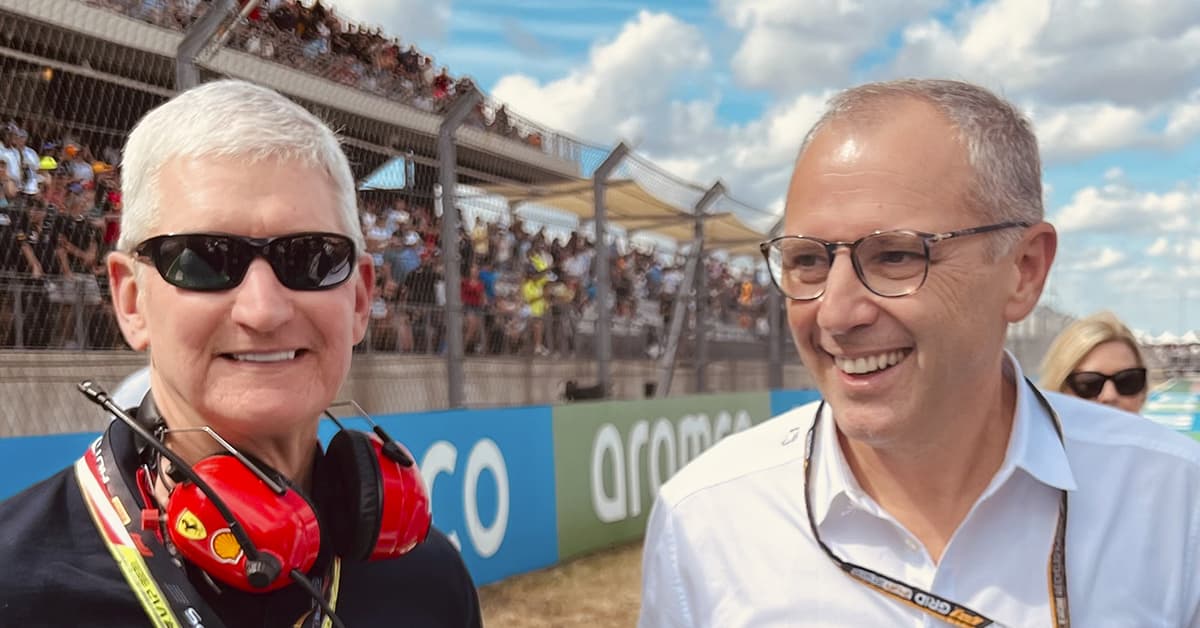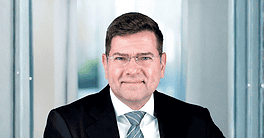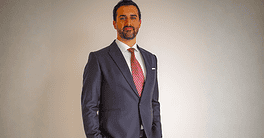Global Finance speaks to Stefano Domenicali, president and CEO of Formula 1, about the current economic climate and what sustainability means to the company.

Formula 1, the LibertyMedia auto-racing subsidiary, is much changed since Stefano Domenicali took over as president and CEO just two years ago. The number of races has increased and the number of teams is about to do the same, and priorities seem to have changed, with sustainability a new byword. The company aims to reach net-zero carbon emissions by 2030—not just for the cars but across all its operations and events. It is discussing with fuel companies development of 100% sustainable energy as the sole source for all its cars by 2025, ultimately to be marketed to a wider public. Renewable electricity sourcing is also goal for its factories, facilities and venues.
The company is also seeking to improve diversity throughout the organizazion, and particularly among drivers. F1 is working on a all-women championship series, to tackle the lack of female drivers. No woman has qualified to compete in an F1 race since 1980. The target, according to several reports, will be younger women from 16 to 22 years old. F1 is sponsoring education programs to encourage the study of STEM subjects. One of the goals is to increase the diversity of participation at all levels of the organization. The company is further expanding its market reach via its recent program about Formula 1 on Netflix.
Add to that the launch of spending caps for the racing teams, a controversial move, to level the playing field of the F1 participants by putting the emphasis on each team’s ingenuity rather than the depth of their pockets. He believes F1 could be a sustainability model for the automotive industry and others, with his goal of net zero carbon by 2030 and a sustainable fuel by 2025.
Domenicali was the CEO of Lamborghini from 2016 to 2020, and before that was team principal for Ferrari in F1. As the head of a global and fast-growing organization—one of the largest in the sports world—he deals with sustainability issues, supply chain concerns and diversity goals. Based in London, but always on the road for the races and new business, he spoke to Global Finance during a recent visit to New York. Last year, the F1 group reported an revenue increase of 87%, to $2 billion and managed to return to an operating profit of $40 million after a loss of $444 million the previous year. All this for a company now traded on Nasdaq and with a market cap of nearly $13 billion.
Global Finance: What has the pandemic meant for F1 and for you?
Stefano Domenicali: If you talk about Covid-19, I’ve learned a lot of things living in London and trying to react to Covid-19 and create opportunities. We didn’t panic, but we reacted. Actually, we were a benchmark for other sports internationally. We showed a system of being organized with bubbles to keep people separate, with masks, with vaccination. Even today, the people that are working for us have to be vaccinated.
In London, as you know, Covid-19 has been taken totally different. Since the end of last year there was no mask requirement, full campaign or vaccination going ahead (in the UK), and we were going to other places where the mask is still alive, but with PCR testing. Today there are certain countries where there is still a Covid-19 issue—take the example of China—and where we don’t know exactly where we stand. A few weeks ago, I was in Singapore to overview a possible investment there, and they still require a PCR test.
GF: You are having more races in the US—now three per year rather than one—but where is growth for Formula 1 in general?
Domenicali: I think that growth is and will be related to our different approach. First of all, we were a very super-exclusive, and, I would say, not-approachable sport. We moved to being a very inclusive sport. Changing our communication plan, being active on social media, trying to maximize the visibility of our protagonists—drivers, and teams—to a dimension that was not there before. Having the possibility also to grow with narratives and with content like our successful show on Netflix [just renewed for a fifth season] represents a dimension that was not really present before.
GF: Tell us about your sustainability efforts.
Domenicali: We made some important changes with regard to the sustainability of sport. Working on new regulations to have more competitive racing, and working on the financial stability of the system, working on the budget cap (for each team), allowing the team to be sustainable from the business point of view and, and allowing them to really (I would say brutally) make money on what is their business to develop. The third element is to keep the dimension of F1 international and try to maximize the commercial opportunities that we saw, and growing step by step around the world. In an average year we used to have a calendar of 17 races, and now we’re moving towards 23-24 races. I think that is showing the interest that we have generated as a sport.
Therefore, I would say these are the most important elements. And I see in this context, you know, a great relationship with our stakeholders, and with our partners. Because this has attracted new sponsors, New Grand Prix that wants to have Formula 1. And I would say that the positivity around us is also related to our sustainable plan for the future with regard to carbon neutrality by 2030, that has enabled us to be credible [to] investors. All these elements have taken this sport in a very healthy space.
GF: Is there a risk that every country and every team would do something different in their races? And has there been there a reaction to new regulations?
Domenicali: No, from a general point of view, I would say what we’ve seen is that there is a very big alignment on what we are doing. If we take sustainability and the fact that we were, by the way, the first sport to have the most efficient engines since 2014, hybrid ones, and that we have already decided to go fully sustainable fuel and hybrid from 2026, we saw that as a big opportunity for the automotive sector to be much more effective in a world where there is a big push to be fully electric.
We do believe that there are other possibilities to achieve the ambitious targets that the politicians have given to the industry. On sustainable fuels, Formula 1 will accelerate because this is our DNA and will accelerate the usage of these sustainable fuels. For commercial vehicles that will never go electric, for planes that will never go electric, for ships that will never go electric. We will accelerate the development of this kind of fuel, which will help to the mission to grow to zero (carbon) in the future.
GF: Is there anyone holding you back within the industry?
Domenicali: No. Everyone sees as an opportunity now. And this is great. That’s why we also have the interest for new automotive manufacturers to come into F1. We have a big push on all the promoters that to use sustainable or biofuel when they have to generate the electricity to run the big shows that we are organizing. We have (sometimes) 400,000 spectators in the same place. We need to make sure that everything is done in the proper way.
GF: Sustainability is your number one priority?
Domenicali: Yes. Because at the end of the day today–and I tell you (from) my private experience–if you don’t have something to present in that landscape that is serious, no one wants to talk with you business-wise. If we are not credible in that landscape, no one is with you. Today we have so many partners, commercial partners working with us or with the teams, like never before. It means that what we are presenting is something that they embrace as a project.
GF: We are discussing the climate. But these days we also have high inflation, higher rates. How does it affect Formula 1?
Domenicali: I think this is (also) the opportunity to say from the cost perspective: this is a challenge, and the teams have reacted to the budget cap. The top teams two years ago–not 30–were spending more than the double what they can spend now. So, it’s just a way for the teams to react and to adjust that this will be an opportunity for the teams to be much more efficient.
GF: And the global economic situation?
Domenicali: The fact that is from day to night, the cost of transports moved up three times, even four times, for the international flights. And we take care of moving all the freights. As you know, transportation has completely changed, and so has the energy situation, and these are things that are affecting the business from the cost perspective. But because there is a limit on what you can spend, this is pushing the system to react and try to minimize this negative effect on the car structure. So, we take these changes as an opportunity to improve the business.
GF: And in terms of supply chain?
Domenicali: The supply chain has been for sure an issue. But also in that respect, I would say the team of Formula 1 has has developed a very integrated supply chain where basically a lot of the most critical components and parts are done in house or prepared with a very solid supply chain relationship with different suppliers. As a result, we haven’t so far suffered, like other industries, of this crisis.
GF: In your last conference call, after the results of the third quarter, the analysts asked if OEM (Original Equipment Manufacturers) will be eventually coming into F1.
Domenicali: I would say they’re coming in. We welcomed that the entry of Audi, that has already informed us that is coming in. There are ongoing discussions with other OEM that are interested, to see our plans for the future. So that means that the good vibes that we are living today is really spreading out with different companies, which before were not really involved in our business.
GF: Formula 1 is currently listed on Nasdaq and has Liberty Media as a controlling shareholder, what has it changed for F1?
Domenicali: From my perspective, first of all, I need to be very grateful to Liberty Media for the way they manage the business because they let us be very focused on the operation of the business, and creating value for that business. Today, I can see Liberty Media is totally focused on our business, and this is a great, great opportunity for us to keep working and pushing for the best of the sport itself. And I really love the challenge.
GF: Is there anything keeps you up at night? What are you concerned about?
Domenicali: I sleep at night because I have very intense days and I need to recover. But I think that life is made by cycles, and we are still in a very high side of the cycle. This is the moment when we need to think how we can be strong when the things will slow down. All the elements that I can see in front of us are very, very positive. Covid-19 has showed us that from day to night something critical can happen. The more solid we are in our fundamentals of the business, the more we can react to things that can happen in the world. But so far (the economic crisis) is something related to many external factors that are not inside our sport business. For us the mitigating factor is that we are embracing the world.
GF: How much Formula 1 is still a sport and how much is an entertainment? I know you will tell me that you’re totally committed to the sports side of it, but I’m curious for your answer.
Domenicali: I will tell you that we are totally committed to keep the sport in the center of what we are doing. But we don’t have to forget that we want to be the biggest sport platform of the world. Therefore, you can have great racing, but it’s not enough. You need to create a unique experience, a unique event where you have music, fun, entertainment, and action, because this is the only way to keep the attraction for different categories of fans, and not only the ones that focus on the sport. We are also growing in other parts of the world, where the sport has still to be developed. This is happening because we are now becoming attractive because of lifestyle. We are in a sort of circle on which one element is feeding the other: Sport is at the center, but entertainment in general is what we are.
GF: Currently the vast bulk—80%—of F1 revenue comes from contracts with the automotive groups and the sponsors, correct?
Domenicali: Yes. There is a big opportunity to develop new fonts of revenue related to how we can maximize the monetization (of our events), and new funds are coming into the business. We need to create other form of revenues, and the possibility to grow in places where before there were no investments in our sport. Before it was a very traditional business model. We had the promoter’s revenues, we had sponsored revenues, we had media rights revenues. Now we are embracing a new category where all the things related to the attention to fans can be explored. So that’s a big, big business that we need to develop in the future.
GF: Is there an Italian component in Formula 1 and how relevant is it?
Domenicali: I think that Italy is a central part of this sport. Because at the end of the day in terms of technology, of passion, of promoters, of (race) tracks, in term of competence…. Italy is for sure at the center, together with the UK. We have just celebrated the hundred anniversary of the Monza Grand Prix in Italy this year.
History in itself is not enough. History is good foundation but to sink down into historical elements is not what we want. The competition is getting tighter, the competition is getting bigger, and Italy has to react in the best way because the elements of being the best are still there. And as an Italian man, I would love to see that, really with the right approach at all levels.
GF: Social diversity is also important in your current agenda.
Domenicali: We’re going to do something special soon to make sure that the women in the sport can have some possibility and a chance to grow. Our duty is to take away the physical barriers that could be seen as detrimental for their growth.
To make sure that we are credible, we need to do the right things. On the other hand, we are not only focused on drivers, but we are focused on giving the chance also to women and unprivileged communities to be part of our world. For that we have projects in education. We are offering stages and the possibility to work with teams in order to create the interns that can be where they were not present before. For example, when F1 is going to new countries, we talk to the local community and try to see what we can do for them. And this is what we did, for example in Miami. This is we’re going to do in the future everywhere around the world.
GF: From the managerial point of view, what has been the biggest challenge in the last few years? Covid-19?
Domenicali: Yes, but Covid-19 not only as an external factor to manage. I came to work in an organization where my first contacts were done with live videos through computers because it was a home working situation. When you want to be effective, and you need to know your people, doing it through the video is not great. But, as I said, no crying, just action.



